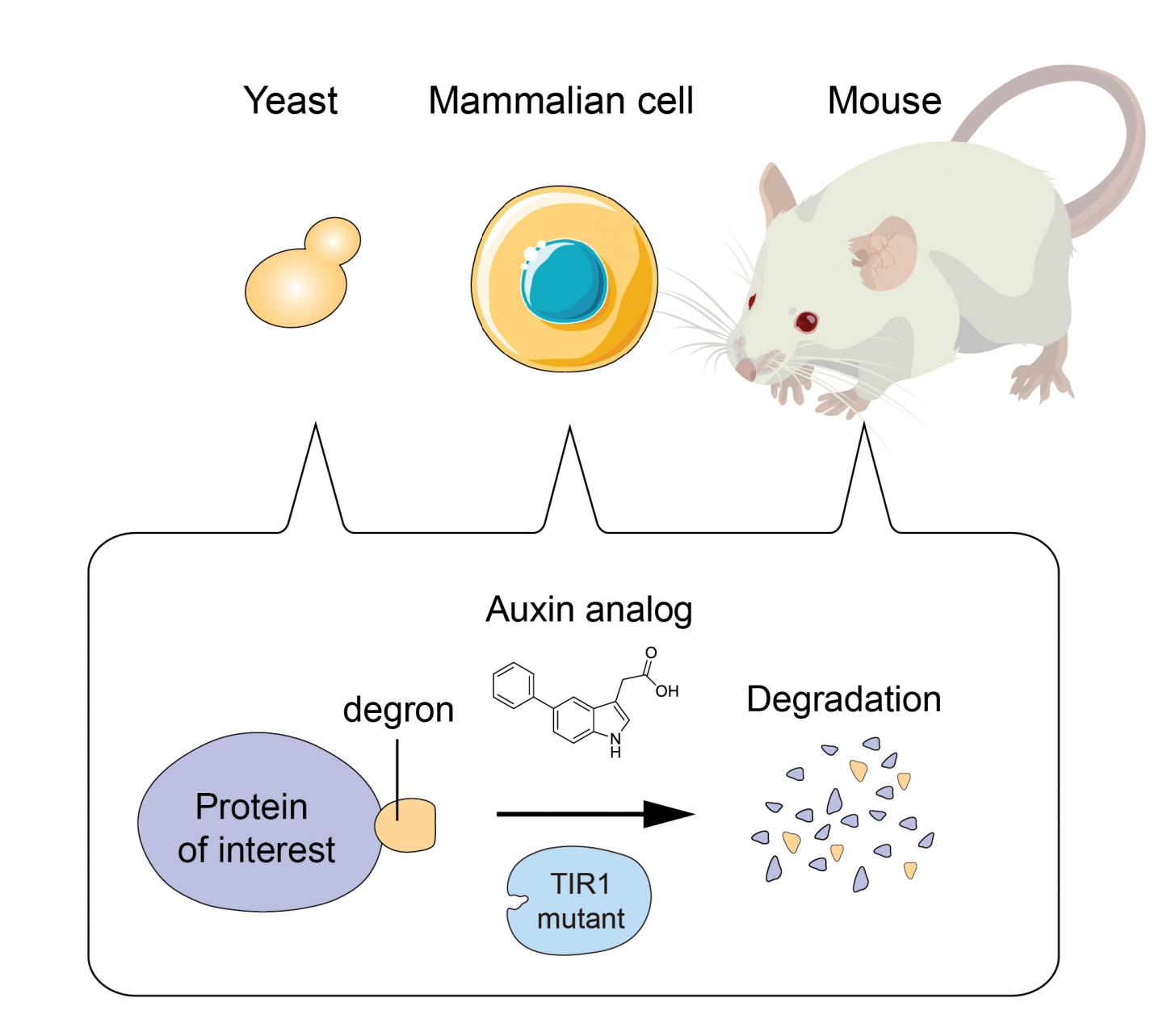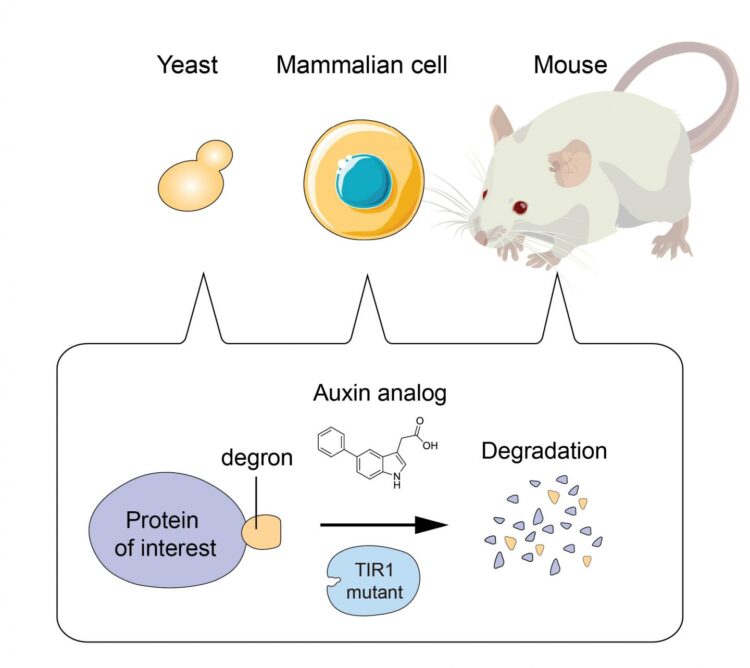
Credit: Masato Kanemaki
Researchers can now more accurately and precisely target specific proteins in yeast, mammalian cells and mice to study how knocking down specific protein traits can influence physical manifestation in a cell or organism.
The Japan-based team published their results on November 11th in Nature Communications.
“Conditional gene knockout and small interfering RNA (siRNA), which is used to silence proteins without knocking them out completely, has been employed in many studies,” said Masato T. Kanemaki, professor at the National Institute of Genetics in the Research Organization of Information and Systems (ROIS). “However, these technologies are not ideal for studying highly dynamic processes, such as cell cycle, differentiation, or neural activity, because of the slow rate of depletion of the protein of interest.”
Kanemaki and his team had previously developed an approach called the AID system, which uses a small protein tag, known as a degron, fused to proteins to induce degradation. To initiate the degradation process, the researchers administered auxin, a plant hormone that helps regulate plant growth. In previous conditional gene knockout and siRNA studies, according to Kanemaki, it typically takes two or three days for a target protein to deplete. The AID system allows for a general, more efficient approach by which the target protein can be depleted in less than a few hours.
“The original AID system has two major drawbacks: leaky degradation and the requirement for a high dose of auxin,” Kanemaki said. “These negative features make it difficult to control precisely the expression level of a protein of interest in living cells and apply this method to mice.”
The ability to knockout genes in mice is a critical step in genetic research and therapeutics. According to Kanemaki, an approach may work well in cultured cells, but it must work in a whole model system, such as a mouse. The “leaky degradation” of the AID system meant that a targeted protein would only degraded weakly without auxin, but the level of auxin required to induce full degradation appeared to have long-term negative effects on cell growth.
“In this paper, we describe the AID2 system, which overcomes all the drawbacks of the original AID system,” Kanemaki said, noting that they did not detect leaky degradation with the system, the degradation was quicker, and the required dose of auxin was much lower.
To establish the AID2 system, the researchers employed what is known as a “bump-and-hole” strategy to create an empty space in a mutant version of a plant protein (called TIR1) that recognizes and induces the degradation of degron-fused proteins. An auxin analog can bind directly to the TIR1 mutant and initiate the degradation process. Since the approach is very efficient, less auxin analog is needed. The researchers found that depletion could be induced at a concentration about 670 times lower than in the original system.
“With the AID 2 system, it is possible to rapidly deplete a protein of interest in cultured cells and mice,” Kanemaki said. “Next, we plan to use the system to find something new in chromosome biology, and to apply the AID2 system to other model organisms.”
###
This work was supported in part by the Ministry of Education, Sports, Science and Technology, the Japan Society of the Promotion of Science, the Takeda Science Foundation, the Asahi Glass Foundation, and the Japan Agency for Medical Research and Development National BioResource Project Fundamental Technologies Upgrading Program.
Kanemaki is also affiliated with the Graduate University for Advanced Studies (SOKENDAI). Other contributors include Aisha Yesbolatova, ROIS and SOKENDAI; Yuichiro Saito, ROIS; Naomi Kitamoto, ROIS and FIMECS, Inc.; Hatsune Makino-Itou, ROIS; Reiko Ajima, SOKENDAI and ROIS; Risako Nakano, University of Tokyo; Hirofumi Nakaoka, SOKENDAI, ROIS and Sasaki Foundation; Kosuke Fukui, Okayama University of Science; Kanae Gamo, FIMECS, Inc.; Yusuke Tominari, FIMECS, Inc.; Haruki Takeuchi, University of Tokyo; Yumiko Saga, SOKENDAI, ROIS and University of Tokyo; Ken-ichiro Hayashi, Okayama University of Science.
About the Research Organization of Information and Systems (ROIS)
ROIS is a parent organization of four national institutes (National Institute of Polar Research, National Institute of Informatics, the Institute of Statistical Mathematics and National Institute of Genetics) and the Joint Support-Center for Data Science Research. It is ROIS’s mission to promote integrated, cutting-edge research that goes beyond the barriers of these institutions, in addition to facilitating their research activities, as members of inter-university research institutes.
About National Institute of Genetics (NIG)
National Institute of Genetics (NIG) was established to carry out broad and comprehensive research in genetics. NIG contributes to the development of academic research as one of the inter-university research institutes constituting the Research Organization of Information and Systems (ROIS).
Media Contact
Masato Kanemaki
[email protected]





